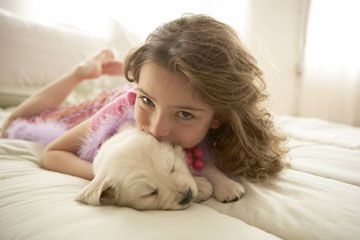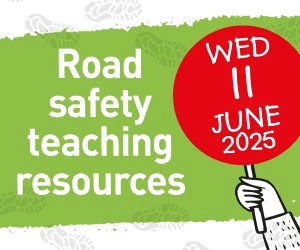Primary Times - the definitive what’s on and where to go family guide of activities and events for children of primary school age. Things to do with your kids during the school holidays including arts and craft activities, music and theatre for children, parties, competitions, days out, and family attractions along with term time drama schools, dance classes, after school clubs and sports activities. Things to do at a place near you!
Are Pets Good for Children?
 In a word, yes. Many surveys have concluded that pet ownership is good for individuals, for families and for children. The benefits of having a pet include improved health, less stress and of course, companionship. According to the RSPCA website “having a dog can help children develop kindness, understanding and respect for living things. Dog companionship can improve a child’s social skills with people and caring for a pet can encourage responsibility.” Apart from these advantages studies in Finland, the USA and the UK have stated that there are health benefits for children who grow up in houses where pets live. In Finland researchers found that babies exposed to dogs and cats spent less time with ear infections, coughs and runny noses and were less likely to need antibiotics than their contemporaries. In the US some studies suggest that children who grow up with pets are less at risk of developing allergies and asthma. Other surveys in the United States suggest that pet-owning children do better academically.
In a word, yes. Many surveys have concluded that pet ownership is good for individuals, for families and for children. The benefits of having a pet include improved health, less stress and of course, companionship. According to the RSPCA website “having a dog can help children develop kindness, understanding and respect for living things. Dog companionship can improve a child’s social skills with people and caring for a pet can encourage responsibility.” Apart from these advantages studies in Finland, the USA and the UK have stated that there are health benefits for children who grow up in houses where pets live. In Finland researchers found that babies exposed to dogs and cats spent less time with ear infections, coughs and runny noses and were less likely to need antibiotics than their contemporaries. In the US some studies suggest that children who grow up with pets are less at risk of developing allergies and asthma. Other surveys in the United States suggest that pet-owning children do better academically.
While these studies are questioned by other experts there is little doubt that a child with a pet to care for develops a sense of responsibly, empathy, nurturing skills and a certain degree of independence (if they are put in charge of some or all of the pet’s care.) One of the reasons why dogs are such popular pets is that they provide uncomplicated, unconditional love for their owners. According to the SCAS (The Society for Animal Companion Studies) pets are supportive to children during stressful periods such as adolescence, family illness or breakdown.
Dogs are one of the most popular pets and it’s easy to see why – dogs are very like people – they have distinctive personalities, likes and dislikes. But dogs are not furry people, they are animals and need to be respected as such. The RSPCA website warns that “children are far more likely to be bitten by their family dog than others.” If you have a dog, or are thinking of getting one, remember that children need to be supervised whilst playing with it and you should never leave any child alone with a dog.
Another obvious side effect of dog ownership is increased exercise as dogs need to be walked. From the dog’s point of view a walk isn’t merely about getting enough exercise but about getting mental stimulation. Dogs get bored and this is one of the reasons why animal experts advise against bringing dogs into households that are empty all day.
Before committing to a dog – and it is a commitment as most dogs will live at least a decade, you need to weigh up the dogs needs against your own – do you have enough space? Will you be able to give the dog sufficient exercise? Will the financial burden of food and healthcare for the dog be manageable? Will there be someone around to keep the dog company during the day?
Then there’s the debate about getting a puppy or a rescue dog. With puppies you can trace their family history and find out about any traits or illnesses – only ever purchase a puppy from a reputable breeder. The puppy will grow up in your home and your family can be pretty certain of the dog’s personality. Puppies whilst cute are hard work – toilet training for example. Getting a rescue dog is a laudable thing to do but bringing an older dog, whose background and personality are not fully known, into a house with children is tricky. Be sure to go to a reputable animal shelter – where they do their best to match dogs with the most suitable families.
Cats are generally less labour-intensive than dogs but can provide the same amount of comfort and love for families and children. The rule with cats is the same – if you are buying kittens go to a reputable breeder and if you are rehoming a stray or rescue cat make sure to do so through a legitimate animal shelter.
Some people think small furry creatures (rodents, basically) are the best solution for providing their kids with pets - but remember not all small furry creatures are the same. Hamsters are popular pets but they are nocturnal, they don’t like being handled much, can be a bit nippy and aggressive and generally live between two to three years. Guinea Pigs are pretty docile and experts recommend getting two to keep each other company. They live approximately five years. Gerbils live about two years and are very sensitive to changes in their environment and don’t react well to humidity. All of these animals need plenty of space in their cages and toys to keep them occupied. Be warned, even when their cages are kept spotlessly clean there will still be a distinctive smell.
Given the choice between rats and lovely cuddly Easter Bunnies most parents would probably pick the bunnies. In fact rats make better pets for children! Rats are pretty smart, sociable, like to learn tricks and don’t mind being handled. Rabbits on the other paw are generally not keen to be picked up and have been known to injure themselves (sometimes fatally) in an effort to get away, not to mention biting and scratching the person holding them.
The benefits of pet ownership are huge but having a pet, no matter how big or small, involves patience, time, effort and money.
Royal Society for Prevention of Cruelty to Animals www.rspca.org.uk
The Society for Animal Companion Studies www.scas.org.uk




